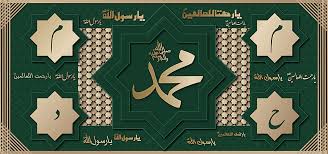life of the Prophet Muhammad (ﷺ)


The Quran enumerates little about the early life of the Islamic prophet Muhammad or other biographic details, but it talks about his prophetic mission, his moral excellence, and theological issues regarding him. According to the Quran, Muhammad is the last in a chain of prophets sent by Allah (33:40). Muhammad in Qur’anThe name "Muhammad" is mentioned four times in the Quran, and the name "Ahmad" (another variant of the name of Muhammad) is mentioned one time.[1] However, Muhammad is also referred to with various titles such as the Messenger of Allah, Prophet, unlettered, etc., and many verses about Muhammad refer directly or indirectly to him.[2][3] Also, Surah (chapter) 47 of the Quran is called "Muhammad".
The most definite date of the Prophet's birth that has been recorded is 12th of Rabi' aI-Awwal. Some people celebrate his birthday every year, known as the Milaad-Un-Nabi. He was born in A.D. 570/571 in the once prestigious but losing Bani Hashim clan of the Quraysh, the ruling tribe of Mecca, a city in the Arabian peninsula, on a Friday (Jumuʿah). Muhammad traces his lineageThe prophet's Birth through his ancestor Adnan back to Ishmael, the son of Ibrahim (Abraham). His father was Abdu'llah, the son of Abd al-Muttalib (Shaybah ibn Hashim), the son of Hashim, the first Hashemite. Abdu'llah died before Muhammad's birth while his mother Aminah bint Wahb passed away five to six years later.
when the Prophet Muhammad(ﷺ) was 4years he was visted by two angles and skined him when he was staying with Halimah al-Sa'diyah (Arabic: حليمة السعدية), who was the foster-mother of the prophet Muhammad. Halimah and her husband were from the tribe of Sa'd b. Bakr, a subdivision of Hawazin (a large North Arabian tribe or group of tribes) to remove evil soul washed by Jamjam and the prophet was a non evil which always disturbs individuals
And any thing that could come out of the hands of the prophet was medicine Forexample over his wests the servant of the prophet once took the water that he used to wash his hands and his servant took an knowing and he was not affected
whenever the pfophet was asleep he could know each and everything taking place
The hard the shead above him whenever he was moving
He was served with little milk which he then served to very many people(one woman invited the prophet (pbuh) him alone but he came with the mosque
)
Al-Isra’ wal-Mi’raj: The Story of the Miraculous Night Journeyread more about Al-Isra’ wal-Mi’raj
what makes the Qur’an to be considered as a miracle
A number of terms are used in Islam to refer to the claims of events happening that are not explicable
by natural or scientific laws, subjects where people sometimes invoke the supernatural. In the Quran the
term āyah (/ˈɑːjə/; Arabic: آية; plural: آيات āyāt, literally "sign") refers to signs in the context of miracles
of God's creation and of the prophets and messengers (such as Ibrahim/Abraham and Isa/Jesus). In later Islamic
sources miracles of the prophets were referred to by Muʿjiza (مُعْجِزَة),[2] literally meaning "that by means of which
[the Prophet] confounds, overwhelms, his opponents"), while miracles of saints are referred to as karamat
(charismata). I'jaz al-Quran – literally the inimitability of the Quran – refers to the Quranic claim
that no one can hope to imitate its (the Quran's) perfection,[2] this quality being considered the primary
miracle of the Quran and proof of Muhammad's prophethood. In recent decades, the term I'jaz has also come to
refer to the belief that the Quran contains "scientific miracles", i.e. prophecies of scientific discoveries.
Kharq al'adad – "a break in God's customary order of things" – was a term used in "theological or philosophical
discussions" to refer to miraculous events. Karamat – "gifts or graces" – was usually used for miraculous
performances of Sufi saints often used to convert unbelievers to Islam (considered a work of "divine generosity"
rather than "divine power" employed in the miracles of prophets).
And the Qur’an have verses that no body can interprint Ya'. Sin.1
(يٰسٓ ۚ)


Allah is the greatest
The first of the five pillars of Islam is belief in Allah. As Muslims, we believe in Allah in accordance with His beautiful names and attributes. Learning and memorising the names of Allah (SWT)99Names of Allah will help us to identify the correct way to believe in Him.